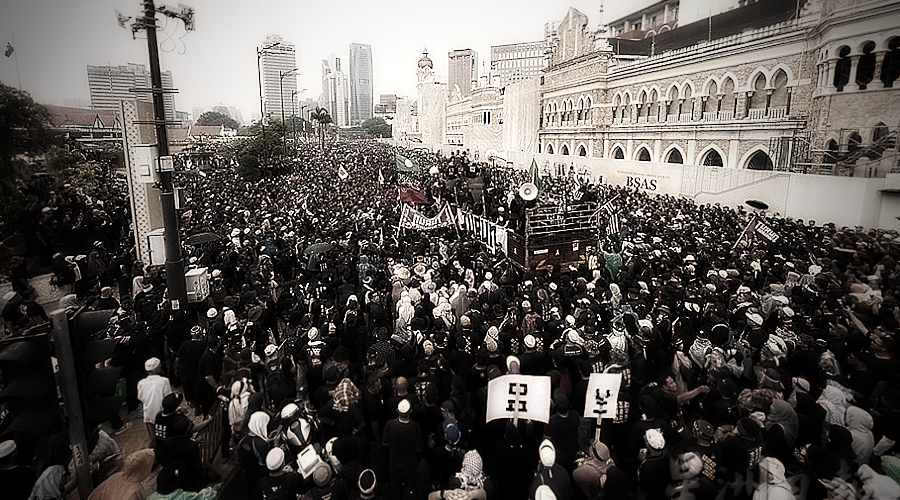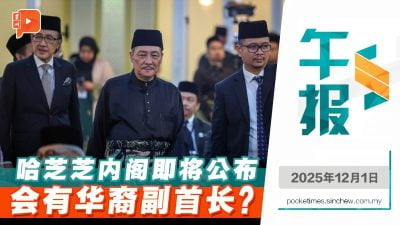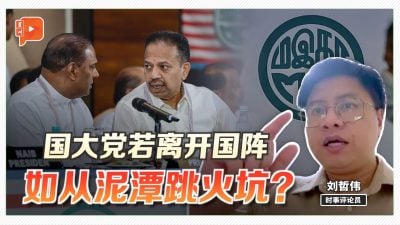
On July 14, Prime Minister Datuk Seri Anwar Ibrahim posted a mysterious single-word message “Nantikan” on Facebook that instantly evoked a lot of attention and speculation from the Malaysian public.
The tactic, often seen in olden days to draw consumers’ eyeballs to an upcoming blockbuster, is now adopted by Malaysia’s Madani government for some kind of political propaganda.
Unfortunately, the generous cash handouts have been met with only lukewarm responses.
No matter how hard the Unity Government has attempted to deny, Anwar’s populist measures have been designed specifically to counter this Saturday’s “Turun Anwar” rally orchestrated by the opposition PN alliance, in a bid to tame public frustration and shrink the weekend turnout to less embarrassing levels.
Exploiting the anxiety and frustration of cash-strapped rakyat, PN has in the past several months waged intense onslaught against the Anwar administration while drawing up a series of street protests aimed at taking down Anwar, starting with an event at Alor Setar’s Stadium Sultan Abdul Halim last Thursday in hope of toppling the Unity Government by arousing the people’s anti-establishment sentiment.
PN claimed that the Kedah rally saw an attendance of nearly 30,000 mostly Malay participants. By comparison, the Bersih rallies in the past were attended mostly by DAP’s supporters and a younger, multiracial crowd.
In view of this, the PN-anchored “Turun Anwar” rally this time is anything but representative of the country’s multicultural fabric. And the effort of Gerakan Rakyat and Bersatu’s non-bumi arm hardly galvanized non-Malays into action.
In any way, while the rally appeared more like a display of some Malays’ unhappiness towards Anwar’s government, in reality it was a testbed for PAS’ renewed attempt to launch a new wave of green tsunami.
While the numbers did meet initial projections, they were far from “earth-shaking,” as Chinese and Indian Malays largely stayed on the sidelines thanks to PAS’ dominant involvement.
Sure enough a rally or two will not get Anwar to step down, and as such, it is foreseeable that more “Turun Anwar” rallies could be in the pipeline at least until the 16th general election.
So, when is the best time for election?
Anwar has planned to stretch his term to 2027 as he pins his hopes on completing several reform initiatives before the end of this year—including the optimization of diesel and RON95 subsidy mechanism—so as to create a favorable condition for election by throwing in a couple more “feel good” measures for Malaysians.
That being said, no matter how hard Anwar has tried to win the hearts of civil servants and the Malay electorate, he would never actually earn the trust of majority of Malay voters.
As if that’s not enough, the sluggish progress of his reform agenda makes it impossible for him to quickly fulfill his many election promises, culminating in gradual thinning of his urban Malay support base.
In the meantime, the many promises Pakatan Harapan made to the local Chinese and Indian communities while still in the opposition remain very much today unreachable stars in the night sky. This has effectively cooled the once avid political enthusiasm of many a non-Malay voter.
If Pakatan, in particular DAP, still fantasize that Chinese Malaysians will continue to support them in the face of an apparent green wave threat, they will be the ones to suffer the unexpected consequences!
DAP and the Unity Government must never think they can get Ahmad Zahid, the Umno president, to hold his party to ransom, and fight the next election war with them in one accord.
As a matter of fact, the other two minor partners of BN—MCA and MIC—could be closely monitoring Umno’s next move before they make theirs.
Malays who are unhappy with the government have so far stayed away from the street. Like their Chinese and Indian compatriots, they hope the government can safeguard their rice bowls and honor its pledges—not endless power struggle, smothering tax burden, and the cost of living that goes through the roof.
If PH or the Unity Government continue to fail to win the broad support of Malay voters before the next election, and if PN, in particular PAS, has managed to start a new wave of green tsunami, Umno grassroots might feel they would stand a much better chance closing ranks with their old allies instead of fighting a futile war alongside PH.
Moreover, many in Umno still cannot see DAP eye to eye, while setting their sights on a returning Najib to revive their dreams, thus making the party’s eventual political intent highly unpredictable.
Whether the former PM could walk a free man again before the next general election will decide the political climate in this country.
Just as Ahmad Zahid started his New Zealand trip, 145 Umno divisional leaders met on July 17 to urge PM Anwar to immediately implement Najib’s house arrest addendum.
Najib’s son Nazifuddin said the powerful support for his father was a show of solidarity that would inspire the party to continue to fight for Najib. He even urged all Najib’s supporters and friends to stand with him to bring his father back to politics “to strengthen Umno and to save Malaysia.”
This is the voice of Umno grassroots which Ahmad Zahid cannot afford to overlook.
Meanwhile, the clock is ticking towards the Sabah state election expected to be held in August or September following the dissolution of the state assembly.
Anwar’s Unity Government hopes to delay the next general election until 2027, to give it more time to implement the reforms and win back the favor of the voters.
There are nevertheless voices calling for GE16 to be held concurrently with the Johor and Melaka state elections, thus making it still possible for the general election to be held anytime next year, depending on changes in domestic and international politico-economic climate over the next one year.
The last general election was held on November 19, 2022, with the current parliament expiring in December 2027. Meanwhile, Melaka and Johor state elections were last held in November 2021 and March 2022, respectively, with state assemblies expiring in November 2026 and January 2027. This means these two states must hold their elections latest by January 2027, ideally in next December or earlier.
Although from a legal perspective, the parliamentary, Melaka and Johor state elections can be delayed to February 17, 2028, the second half of 2026, and the first quarter of 2027, respectively, such delays pose tremendous risks and political maneuvering space is limited.
Additionally, with the Johor-Singapore RTS about to be operational and good news keep streaming in, it is unlikely for the Johor state government to wait until January 2027 to hold the state election.
It has been reported that the Johor election could be held in early 2026, or November at the latest.
Following the expansion of the SST scope, businesses have complained about the skyrocketing cost of doing business, while the general public feel the pinch of escalating goods prices.
All this will invariably give the opposition potent ammunition to launch their offensives against the government, especially for PAS which is ambitiously seizing every opportunity to capture Putrajaya.
Anwar’s so-called “surprise” was far below the public’s expectations.
He announced that tolls for 10 highways would not be adjusted this year, but this is nothing like his earlier promise of “abolishing all highway tolls” before the last general election!
As for the additional public holiday on September 15, the move could be counter-productive for the Malaysian business community, as it will not help economic revitalization but will push up operating cost further.
The Malay participants of the rally, to be honest, do not really represent the general population, but are mostly diehard supporters of PAS.
Malays who are unhappy with the government have so far stayed away from the street. Like their Chinese and Indian compatriots, they hope the government can safeguard their rice bowls and honor its pledges—not endless power struggle, smothering tax burden, and the cost of living that goes through the roof.
ADVERTISEMENT
ADVERTISEMENT








































